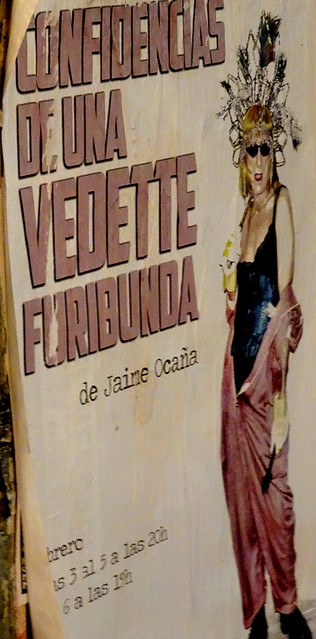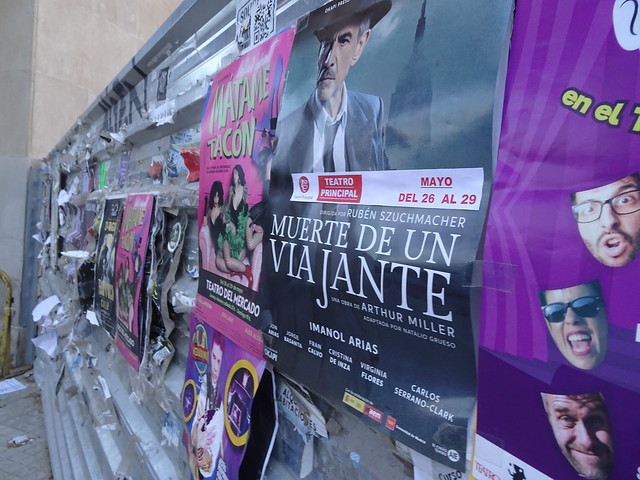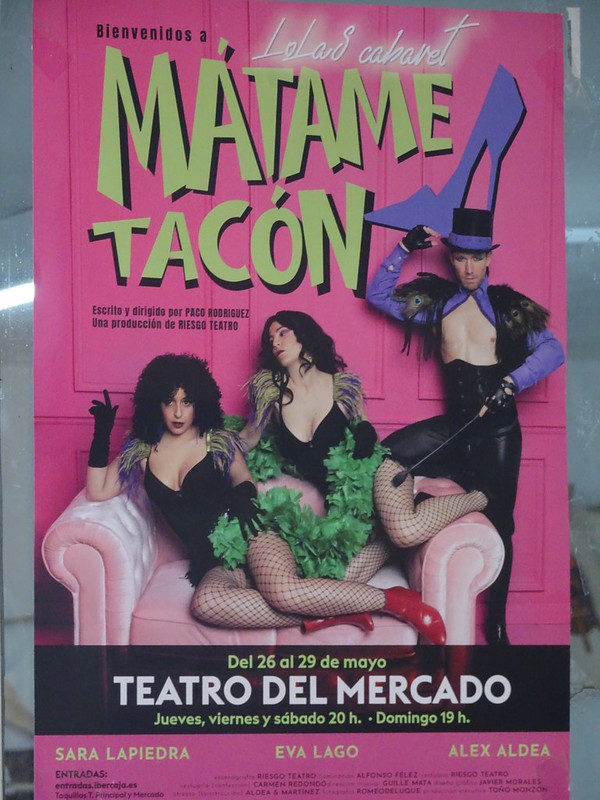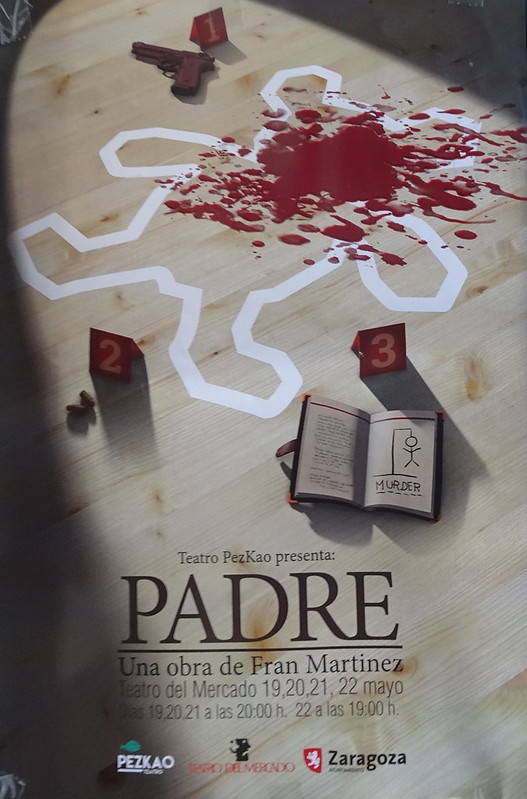Platón, República (s. IV a.c.)
(Sócrates:) "Piensa entonces, Adeimanto, si nuestros guardianes deberían o no ser aficionados a las imitaciones. O, antes bien, ¿no ha quedado decidida ya esta cuestión con la regla ya establecida, según la cual un hombre puede hacer bien sólo una cosa, y no muchas; y que quien se dedica a muchas no conseguirá mucha fama en ninguna de ellas?
(A.). Ciertamente
(S.). ¿Y esto también es cierto de la imitación: que nadie puede imitar muchas cosas tan bien como imitaría una sola?
(A.). En efecto, no puede.
(S.). Entonces, la misma persona mal podrá representar un papel serio en la vida, y a la vez ser un imitador e imitar muchos otros papeles. Porque incluso en el caso en el que dos tipos de imitación están muy ligados, las mismas personas no pueden tener éxito en ambos, como, por ejemplo los escritores de tragedias y los de comedias—¿no las llamaste imitaciones, hace un momento?
(A.). Sí que lo hice, y tienes razón al pensar que las mismas personas no pueden tener éxito en ambas cosas.
(S.). ¿Como tampoco pueden ser a la vez rapsodas y actores a la vez?
(A.). Cierto.
(S.). Ni tampoco emplean los autores cómicos y trágicos a los mismos actores; y no obstante todas estas cosas son imitaciones.
(A.). Lo son.
(S.). Y la naturaleza humana, Adeimanto, parece haber sido acuñada en monedas aún menores, y ser tan incapaz de imitar muchas cosas bien, como de llevar bien a cabo las acciones copiadas por las imitaciones.
(...)
¿No has observado acaso cómo las imitaciones que comienzan a una edad temprana y que continúan mucho tiempo en la vida al final desarrollan hábitos, y se convierten en una segunda naturaleza, que afecta al cuerpo, a la voz y a la mente?
(...)
En lo que se refiere al hombre de vida ordenada (...), cuando llega el momento de describir algún dicho o acción de otro hombre bueno—creo que de buena gana lo representará, y no se avergonzará de efectuar este tipo de imitación: estará muy deseoso de interpretar el papel del hombre bueno cuando actúa con firmeza o con sabiduría." (Libro III).
—oOo—
Platón, Filebo:
"Sócrates: El razonamiento nos
indica, pues, que en los duelos y en las tragedias y comedias, no sólo
en el teatro sino también en toda la tragedia y comedia de la vida, los
dolores están mezclados con los placeres, y también en otras muchísimas
ocasiones." (50)
—oOo—
Platón: Las Leyes:
"también nosotros,
en la medida de nuestras capacidades, somos dramaturgos, y nuestro drama
es el mejor y el más noble, porque la totalidad de nuestro Estado es
una imitación de la vida mejor y más noble, lo cual afirmamos que es
efectivamente la verdad misma del drama. Vosotros sois poetas y nosotros
somos poetas . . . rivales y antagonistas en el más noble de los
dramas."
—oOo—
Epicuro (c. 300 a.C.)
Satis magnum alter alteri theatrum sumus — Somos teatro más que suficiente unos para otros. Un dicho criticado por Bacon en su ensayo "Of love".
—oOo—
Cicerón (s. I a.C.)
Recuerda que los más grandes
(dolores) terminan con la muerte; que los pequeños tienen muchos
intervalos de calma, y que los medianos somos dueños nosotros de
soportarlos, si son tolerables; y, si no lo son, de retirarnos
serenamente de la vida, como de un teatro, cuando no nos agrada. (De finibus bonorum et malorum, 1,49)
—oOo—
Séneca, Epístola 80.7
..."este drama de la vida humana, en el que se nos asignan los papeles que tan mal hemos de representar." Séneca pasa a contraponer la realidad del pobre actor con los regios papeles que representa: ""Allí está el hombre que se pasea por el escenario con andares orgullosos y con la frente levantada.."
—oOo—
Epicteto, Manual, §17 (siglo
I):
"Recuerda que eres actor de un drama, con el papel que quiera el
director: si quiere uno corto, corto; si uno largo, largo; si quiere
que representes a un pobre, represéntalo con nobleza: como a un cojo,
un gobernante, un particular. Eso es lo tuyo: representar bien el papel
que te han dado; pero elegirlo es cosa de otro."
—oOo—
San Agustín (siglo IV):
"También nosotros estamos actuando en la vida, en este mimo nuestro."
—oOo—
Para Honorio de Autun (siglo XII), el sacerdote es un "tragicus" que representa para el pueblo de Dios, en el teatro de la iglesia, el esfuerzo de Cristo y les imprime la victoria de su redención.
—oOo—
A partir del siglo XII, el amor cortés y el ideal caballeresco literarizado se adoptan en la vida social aristocrática como role models — a modo de una teatralización de la vida social, siguiendo patrones literarios.
—oOo—
Michel de Montaigne, Ensayos (I, XX), sobre la indiferencia a la muerte:
"Y en el peor de los casos, la distribución y variedad de todos los actos de mi comedia se acaba en un año. Si os habéis fijado en el movimiento de mis cuatro estaciones, habréis visto que abarcan la infancia, la adolescencia, la virilidad y la vejez del mundo. Ha interpretado su papel. No sabe sino volver a empezar. Siempre será igual." (Ensayos completos, 135)
—oOo—
Ephemerality of the court masque too in Daniel: "Are they shadows that we see" (Thetys' Festival).
—oOo—
Cervantes, Don Quijote (II.xii), tras el encuentro con la carreta de los comediantes de las Cortes de la Muerte:
—Todavía—respondió Don Quijote—, si tú, Sancho, me dejaras acometer,
como yo quería, te hubieran cabido en despojos, por lo menos, la corona
de oro de la Emperatriz y las pintadas alas de Cupido; que yo se las
quitara al redropelo y te las pusiera en las manos.
—Nunca los cetros y coronas de los emperadores farsantes—respondió
Sancho Panza—fueron de oro puro, sino de oropel o hoja de lata.
—Así es verdad—replicó Don Quijote—; porque no fuera acertado que los
atavíos de la comedia fueran finos, sino fingidos y aparentes, como lo
es la mesma comedia, con lo cual quiero, Sancho, que estés bien,
teniéndola en tu gracia, y por el mismo consiguente a los que las
representen y a los que las componen, porque todos son
instrumentos de hacer un gran bien a la república, poniéndonos un
espejo a cada paso delante, donde se veen al vivo las acciones de la
vida humana, y ninguna comparación hay que más al vivo nos represente
lo que somos y lo que habemos de ser como la comedia y los comediantes.
Si no, dime: ¿no has visto representar alguna comedia adonde se
introducen reyes, emperadores y pontífices, caballeros, damas y otros
diversos personajes? Uno hace el rufián, otro el embustero, éste el
simple discreto, otro el enamorado simple; y acabada la comedia y
desnudándose de los vestidos della, quedan todos los recitantes iguales.
—Sí he visto—respondió Sancho.
—Pues lo mesmo—dijo Don Quijote—acontece en la comedia y trato deste
mundo, donde unos hacen los emperadores, otros los pontífices, y,
finalmente, todas cuantas figuras se pueden introducir en una comedia;
pero en llegando al fin, que es cuando se le acaba la vida, a todos les
quita la muerte las ropas que los diferenciaban, y quedan iguales en la
sepultura.
—Brava comparación—dijo Sancho, aunque no tan nueva, que yo no la haya
oído muchas y diversas veces, como aquella del juego del ajedrez, que
mientras dura el juego cada pieza tiene su particular oficio; y en
acabándose el juego, todas se mezclan, juntan y barajan, y dan con
ellas en una bolsa, que es como dar con la vida en la sepultura.
—Cada día, Sancho—dijo Don Quijote—, te vas haciendo menos simple y más discreto.
—oOo—
Shakespeare, Soneto 15:
When I consider every thing that grows
Holds in perfection but a little moment,
That this huge stage presenteth nought but shows
Whereon the stars in secret influence comment;
When I perceive that men as plants increase,
Cheered and cheque'd even by the self-same sky,
Vaunt in their youthful sap, at height decrease,
And wear their brave state out of memory;
Then the conceit of this inconstant stay
Sets you most rich in youth before my sight,
Where wasteful Time debateth with Decay,
To change your day of youth to sullied night;
And all in war with Time for love of you,
As he takes from you, I engraft you new.
—oOo—
— As You Like It (II.7):
DUKE SENIOR
Thou seest we are not all alone unhappy:
This wide and universal theatre
Presents more woeful pageants than the scene
Wherein we play in.
JAQUES
All the world's a stage,
And all the men and women merely players:
They have their exits and their entrances;
And one man in his time plays many parts,
His acts being seven ages. At first the infant,
Mewling and puking in the nurse's arms.
And then the whining school-boy, with his satchel
And shining morning face, creeping like snail
Unwillingly to school. And then the lover,
Sighing like furnace, with a woeful ballad
Made to his mistress' eyebrow. Then a soldier,
Full of strange oaths and bearded like the pard,
Jealous in honour, sudden and quick in quarrel,
Seeking the bubble reputation
Even in the cannon's mouth. And then the justice,
In fair round belly with good capon lined,
With eyes severe and beard of formal cut,
Full of wise saws and modern instances;
And so he plays his part. The sixth age shifts
Into the lean and slipper'd pantaloon,
With spectacles on nose and pouch on side,
His youthful hose, well saved, a world too wide
For his shrunk shank; and his big manly voice,
Turning again toward childish treble, pipes
And whistles in his sound. Last scene of all,
That ends this strange eventful history,
Is second childishness and mere oblivion,
Sans teeth, sans eyes, sans taste, sans everything.
De
ahí quizá el lema del Globe Theatre — y su nombre: "Totus mundus agit
histrionem" (quizá 'todos somos actores' o quizá 'todos imitamos a los
actores').
Macbeth 5.5. 23-27:
Life's but a walking shadow, a poor player
That struts and frets his hour upon the stage
And then is heard no more. It is a tale
Told by an idiot, full of sound and fury
Signifying nothing.
The Tempest 4.1.148-58:
Our revels now are ended; these our actors,
As I foretold you, were all spirits, and
Are melted into air, into thin air;
And like the baseless fabric of this vision,
The cloud-capped towers, the gorgeous palaces,
The solemn temples, the great globe itself,
Yea, all which it inherit, shall dissolve,
And like this insubstantial pageant faded
Leave not a rack behind. We are such stuff
As dreams are made on; and our little life
Is rounded by a sleep.
—oOo—
Sir Walter Ralegh, "On the life of man":
What is our life? a play of passion;
Our mirth, the music of division:
Our mothers’ wombs the tiring houses be,
Where we are dressed for this short comedy;
Heaven the judicious sharp spectator is,
That sits and marks still who doth act amiss;
Our graves that hide us from the searching sun
Are like drawn curtains when the play is done:
Thus march we playing to our latest rest;
Only we die in earnest, that’s no jest.
—oOo—
Cervantes y el teatro vivido de "El curioso impertinente"
Y más sobre la vida como teatro.
—oOo—
John Donne, from Holy Sonnets, "This Is My Playes Last Scene"
This is my play's last scene; here heavens appoint
My pilgrimage's last mile; and my race,
Idly, yet quickly run, hath this last pace,
My span's last inch, my minute's latest point;
And gluttonous death will instantly unjoint
My body and my soul, and I shall sleep a space;
But my'ever-waking part shall see that face
Whose fear already shakes my every joint.
Then, as my soul to'heaven, her first seat, takes flight,
And earth-born body in the earth shall dwell,
So fall my sins, that all may have their right,
To where they'are bred, and would press me, to hell.
Impute me righteous, thus purg'd of evil,
For thus I leave the world, the flesh, the devil.
—oOo—
Francisco de Quevedo, Epicteto y
Phocílides en español con consonantes (Madrid, 1635):
No olvides que es comedia nuestra vida
y teatro de farsa el mundo todo
que muda el aparato por instantes
y que todos en él somos farsantes;
acuérdate que Dios, de esta comedia
de argumento tan grande y tan difuso,
es autor que la hizo y la compuso.
Al que dio papel breve,
solo le tocó hacerle como debe;
y al que se le dio largo,
solo el hacerle bien dejó a su cargo.
Si te mandó que hicieses
la persona de un pobre o un esclavo,
de un rey o de un tullido,
haz el papel que Dios te ha repartido;
pues solo está a tu cuenta
hacer con perfección el personaje,
en obras, en acciones, en lenguaje;
que al repartir los dichos y papeles,
la representación o mucha o poca
solo al autor de la comedia toca.
—oOo—
Calderón, El Gran Teatro del Mundo, (1655):
El personaje del Autor (Dios) habla al Mundo:
Pues soy tu Autor, y tú mi hechura eres,
hoy, de un concepto mío
la ejecución a tus aplausos fío.
Una fiesta hacer quiero
a mi mismo poder, si considero
que solo a ostentación de mi grandeza
fiestas hará la gran naturaleza;
y como siempre ha sido
lo que más ha alegrado y divertido
la representación bien aplaudida,
y es representación la humana vida,
una comedia sea
la que hoy el cielo en tu teatro vea.
Si soy Autor y si la fiesta es mía,
por fuerza la ha de hacer mi compañía.
Y pues que yo escogí de los primeros
los hombres , y ellos son mis compañeros,
ellos, en el Teatro
del mundo, que contiene partes cuatro,
con estilo oportuno
han de representar. Yo a cada uno
el papel le daré que le convenga,
y porque en fiesta igual su parte tenga
el hermoso aparato
de apariencias, de trajes el ornato,
hoy prevenido quiero
que, alegre, liberal y lisonjero,
fabriques apariencias
que de dudas se pasen a evidencias.
Seremos, yo el Autor, en un instante,
tú el teatro, y el hombre el recitante.
(36-66)
(el Autor responde a un pobre que se
queja de su papel:)
En la representación
igualmente satisface
el que bien al pobre hace
con afecto, alma y acción
como el que hace al rey, y son
iguales este y aquel
en acabando el papel.
Haz tú bien el tuyo y piensa
que para la recompensa
yo te igualaré con él.
No porque pena te sobre,
siendo pobre, es en mi ley
mejor papel el del rey
si hace bien el suyo el pobre;
uno y otro de mí cobre
todo el salario después
que haya merecido, pues
con cualquier papel se gana,
que toda la vida humana
representaciones es.
Y la comedia acabada
ha de cenar a mi lado
el que haya representado,
sin haber errado en nada,
su parte más acertada;
allí igualaré a los dos. (409-34)
—oOo—
—oOo—
From
The Short Oxford History of English
Literature, by Andrew Sanders (1994)
"In the Preface to Castle
Rackrent
[1800] Edgeworth had recognized the fluid relationship between her
fiction and the writing of history. In a way that prefigures
Thackeray's suspicion of the elevation of fancy-dress heroes by
historians, she states her preference for a history which looks beyond
the 'splendid characters playing their parts on the great theatre of
the world' and which begs to be admitted behind the scenes 'that we may
take a nearer view of the actors and actresses'."
—oOo—
Sartre, La nausée. El camarero interpretando el papel de camarero.
—oOo—
Peter L. Berger and Thomas Luckmann, The Social Construction of Reality— social roles based on secondary socialization following the individual's primary acquisition of a social identity and a world in childhood:
"Secondary socialization is the internalization of institutional or institution-based 'sub-worlds'. Its extent and character are therefore determined by the complexity of the division of labour and the concomitant social distribution of knowledge" (1966: 158)
"This makes it possible to detach a part of the self and its concomitant reality as relevant only to the role-specific situation in question. The individual then establishes distance between his total self and its reality on the one hand, and the role-specific partial self and its reality on the other. This important feat is possible only after primary socialization has taken place. Put crudely once more, it is easier for the child 'to hide' from his teacher than from his mother. Conversely, it is possible to say that the development of this capacity 'to hide' is an important aspect of the process of growing into adulthood" (1966: 162)
—oOo—
A note to David Marshall's The Figure of Theater: Shaftesbury, Adam Smith, Defoe, and George Eliot (Columbia University Press, 1986):
Introd., note 6:
In addition to the works cited above, there is a rich and growing body of studies which focuses on theater, theatricality, role-playing, play, and related topics in a variety of disciplines and historical periods. Questions about the theatrical conditions of the self and its relation to others are addressed throughout the works of Jean-Paul Sartre and Kenneth Burke. Maurice Merleau-Ponty discusses "le spectacle du monde," "le théâtre de l'imaginaire"," and the other as "spectateur étranger" in Phénoménologie de la perception (Paris: Gallimard, 1945), (pp. iii, v, vii). In sociology, Erving Goffman's work (especially The Presentation of Self in Everyday Life (Garden City, New York: Doubleday, 1959) is concerned with role-playing and the theatrical relations of everyday life; while in anthropology, Clifford Geertz has presented important analyses of theatrical dynamics in Balinese culture. (See "Deep Play: Notes on the Balinese Cockfight" in The Interpretation of Cultures: Selected Essays [New York: Basic Books, 1973], pp. 412-453, and Negara: The Theater State in Nineteenth-Century Bali [Princeton: Princeton University Press, 1980], pp. 98-136). Richard Sennett discusses roles, actors and spectators, and the theaters of public and private life in The Rise of Public Man (New York: Vintage, 1978). Relevant discussions of play include D. W. Winnicott, Playing and Reality (London: Tavistock, 1982); Gregory Bateson, "A Theory of Play and Fantasy," in Steps to an Ecology of Mind (New York: Ballantine Books, 1972), pp. 177-193; Hans-Georg Gadamer, Truth and Method (New York: The Seabury Press, 1975), pp. 91-150; and Johan Huizinga, Homo Ludens: A Study of the Play-Element in Culture (Boston: The Beacon Press, 1955). The significance of the role-playing and spectator-spectacle dynamics in the Renaissance is discussed in Stephen Orgel, The Illusion of Power: Political Theater in the English Renaissance (Berkeley: University of California Press, 1975); Stephen Greenblatt, Sir Walter Raleigh: The Renaissance Man and His Roles (New Haven: Yale University Press, 1973) and Renaissance Self-Fashioning: From More to Shakespeare (Chicago: University of Chicago Press, 1980); Margaret Ferguson, "Nashe's The Unfortunate Traveller: The 'News of the Maker' Game," English Literary Renaissance (1981), 11(2):165-182; Thomas Greene, "The Flexibility of the Self in Renaissance Literature," and A. Bartlett Giamatti, "Proteus Unbound: Some Versions of the Sea God in the Renaissance," in Peter Demetz et al., eds. The Disciplines of Criticism: Essays in Literary Theory, Interpretation, and History (New Haven: Yale University Press, 1968), pp. 241-264 and 437-476. Peter Brooks discusses the importance of melodrama for the nineteenth-century novel in The Melodramatic Imagination: Balzac, Henry James, Melodrama, and the Mode of Excess (New Haven: Yale University Press, 1976). Norton Batkin analyzes the problem of theatricality in the work of Paul Strand (see Photography and Philosophy, Diss. Harvard 1981). Finally, in Worlds Apart: Market and Theater in Anglo-American Thought, 1550-1750 (Cambridge: Cambridge University Press, 1986), a work which treats some of the same issues and authors considered in this book, Jean-Christophe Agnew traces the history of the relation between theater and the markeplace. I cite these various studies both to map some of the territory that forms a context and a background for my own work and to suggest some of the many roads that (inevitably) I have not taken.
—oOo—
"Somos teatreros: El
sujeto, la interacción dialéctica y la estrategia de la representación según
Goffman." Artículo de José Angel García Landa:
—oOo—
Juan Luis Arsuaga y M. Martín-Loeches: El gran juego.
—oOo—
De estas cuestiones teatrales y dramatísticas, y de la Vida como Teatro Viviente, tratamos con frecuencia en nuestro blog sobre EL GRAN TEATRO DEL MUNDO. Donde continúa, que no termina, la trama.










